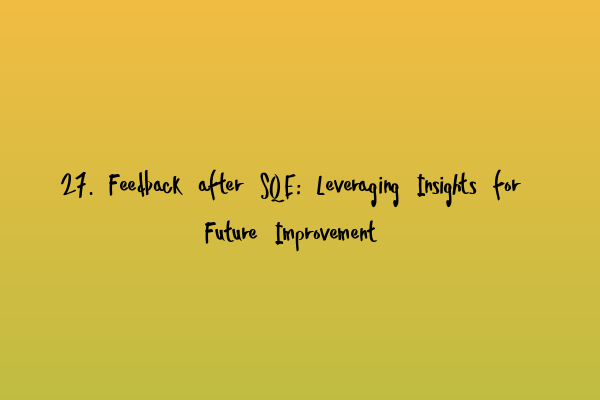As a solicitor, passing the Solicitors Qualifying Examination (SQE) is a significant milestone in your career. It demonstrates your competence and readiness to practice law in England and Wales. However, the journey does not end there. The feedback you receive after taking the SQE can provide valuable insights that can help you improve your performance and enhance your future prospects.
Feedback is a critical ingredient in the learning process. It allows you to identify your strengths and weaknesses, enabling you to focus on areas for improvement. By leveraging the insights gained from feedback, you can develop targeted strategies to enhance your legal knowledge, exam-taking skills, and overall performance.
Understanding the Feedback
Feedback can come in various forms, such as written comments, scores, or verbal discussions with your examiners. It is essential to carefully analyze and understand the feedback you receive. Take note of the specific areas where you performed well and areas where improvement is needed. This will help you orient your future study and preparation efforts.
One common concern many candidates have is regarding time management during the exam. If this is an area you struggled with, consider reading our article on Mastering Time Management in SQE: Strategies for Efficient Exam Completion. It provides useful tips and techniques to help you optimize your time and maximize your performance.
Building on Your Strengths
Feedback is not just about identifying weaknesses; it also highlights your strengths. Recognizing and building on your strengths is just as important as addressing your weaknesses. Take note of the areas where you excelled and consider how you can leverage those strengths in future exams and practice.
For example, if you performed exceptionally well in the multiple-choice questions (MCQ) section of SQE1, you may want to explore our article on Conquer the Multiple Choice Questions (MCQ) in SQE1. It provides valuable insights and strategies to help you excel in this particular exam component.
Developing a Revision Plan
Feedback is an excellent tool for shaping your revision plan. It helps you identify the areas where you need to devote more time and effort. By incorporating feedback into your revision strategy, you can focus on strengthening your weaknesses and consolidating your strengths.
Our article on Mastering Effective Revision Techniques for SQE Success offers valuable guidance and practical tips on developing a comprehensive revision plan. It will help you make the most of your study time and ensure a thorough understanding of the exam content.
Enhancing Problem-Solving Skills
Problem-solving skills are crucial for success in the legal profession. Feedback can shed light on your ability to analyze legal scenarios and apply your knowledge effectively. If you feel the need to improve your problem-solving skills, our article on Scenario-Based Questions SQE2: Enhance Your Problem-Solving Skills can provide valuable insights and strategies to help you develop this essential skill.
Strengthening Core Legal Concepts
Functioning Legal Knowledge (FLK) is a critical aspect of the SQE. Feedback can help you identify gaps in your understanding of core legal concepts. To strengthen your FLK, consider utilizing our FLK mock exams. These mock exams are designed to test your knowledge and reinforce your understanding of essential legal principles. Learn more about our FLK mocks in our article on Functioning Legal Knowledge (FLK) Mocks: Strengthening Core Legal Concepts.
Conclusion
Receiving feedback after the SQE is an invaluable opportunity to reflect on your performance and identify areas for improvement. By effectively leveraging the insights gained from feedback, you can enhance your legal knowledge, exam-taking skills, and problem-solving abilities.
Remember, the SQE is not just a one-time exam; it is a stepping stone towards a successful legal career. Embrace the feedback you receive, develop targeted strategies, and continuously strive for improvement. With dedication and perseverance, you can overcome any challenges and achieve your goals.
